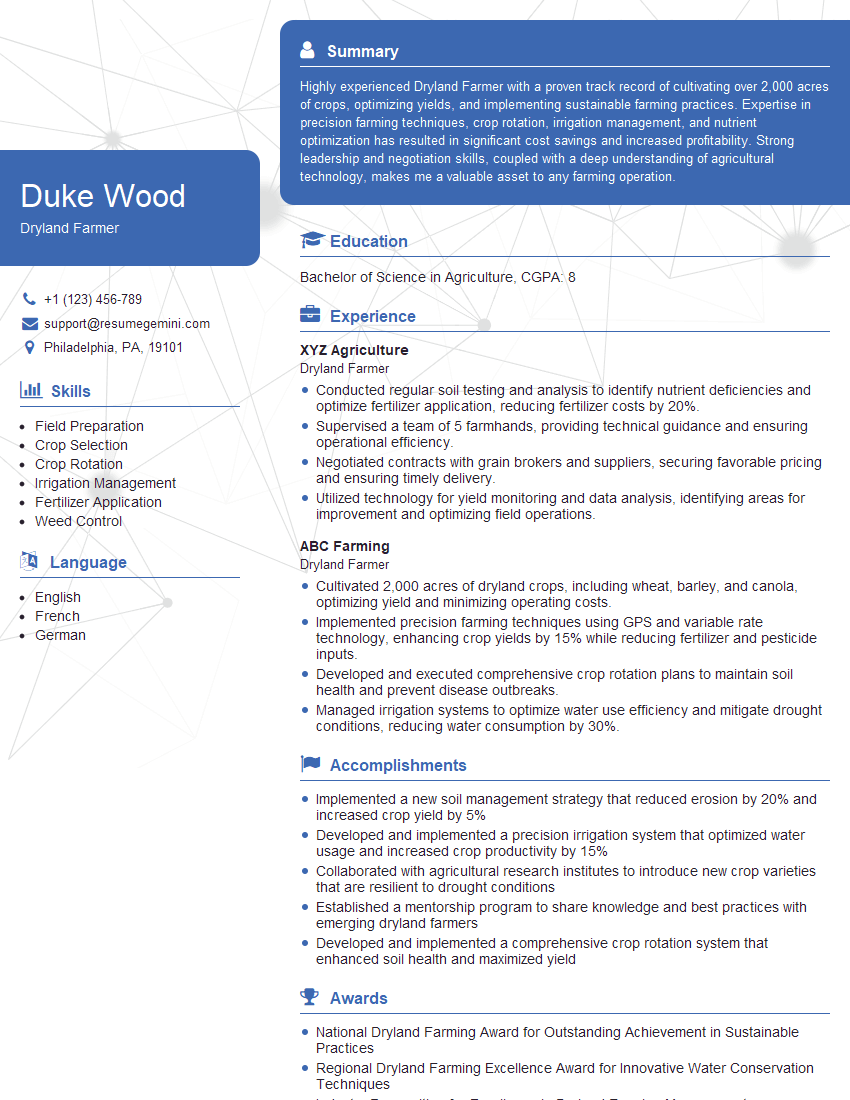Are you a seasoned Dryland Farmer seeking a new career path? Discover our professionally built Dryland Farmer Resume Template. This time-saving tool provides a solid foundation for your job search. Simply click “Edit Resume” to customize it with your unique experiences and achievements. Customize fonts and colors to match your personal style and increase your chances of landing your dream job. Explore more Resume Templates for additional options.

Duke Wood
Dryland Farmer
Summary
Highly experienced Dryland Farmer with a proven track record of cultivating over 2,000 acres of crops, optimizing yields, and implementing sustainable farming practices. Expertise in precision farming techniques, crop rotation, irrigation management, and nutrient optimization has resulted in significant cost savings and increased profitability. Strong leadership and negotiation skills, coupled with a deep understanding of agricultural technology, makes me a valuable asset to any farming operation.
Education
Bachelor of Science in Agriculture
October 2016
Skills
- Field Preparation
- Crop Selection
- Crop Rotation
- Irrigation Management
- Fertilizer Application
- Weed Control
Work Experience
Dryland Farmer
- Conducted regular soil testing and analysis to identify nutrient deficiencies and optimize fertilizer application, reducing fertilizer costs by 20%.
- Supervised a team of 5 farmhands, providing technical guidance and ensuring operational efficiency.
- Negotiated contracts with grain brokers and suppliers, securing favorable pricing and ensuring timely delivery.
- Utilized technology for yield monitoring and data analysis, identifying areas for improvement and optimizing field operations.
Dryland Farmer
- Cultivated 2,000 acres of dryland crops, including wheat, barley, and canola, optimizing yield and minimizing operating costs.
- Implemented precision farming techniques using GPS and variable rate technology, enhancing crop yields by 15% while reducing fertilizer and pesticide inputs.
- Developed and executed comprehensive crop rotation plans to maintain soil health and prevent disease outbreaks.
- Managed irrigation systems to optimize water use efficiency and mitigate drought conditions, reducing water consumption by 30%.
Accomplishments
- Implemented a new soil management strategy that reduced erosion by 20% and increased crop yield by 5%
- Developed and implemented a precision irrigation system that optimized water usage and increased crop productivity by 15%
- Collaborated with agricultural research institutes to introduce new crop varieties that are resilient to drought conditions
- Established a mentorship program to share knowledge and best practices with emerging dryland farmers
- Developed and implemented a comprehensive crop rotation system that enhanced soil health and maximized yield
Awards
- National Dryland Farming Award for Outstanding Achievement in Sustainable Practices
- Regional Dryland Farming Excellence Award for Innovative Water Conservation Techniques
- Industry Recognition for Excellence in Dryland Farming Management
- National Award for Sustainable Dryland Farming Practices
Certificates
- Certified Crop Advisor (CCA)
- Certified Professional Agronomist (CPAg)
- Precision Agriculture Specialist (PAS)
- Certified Soil Scientist (CSS)
Career Expert Tips:
- Select the ideal resume template to showcase your professional experience effectively.
- Master the art of resume writing to highlight your unique qualifications and achievements.
- Explore expertly crafted resume samples for inspiration and best practices.
- Build your best resume for free this new year with ResumeGemini. Enjoy exclusive discounts on ATS optimized resume templates.
How To Write Resume For Dryland Farmer
- Quantify your accomplishments with specific metrics and data points to demonstrate your impact.
- Highlight your expertise in sustainable farming practices, such as precision farming and water conservation.
- Showcase your leadership abilities and experience managing a team of farmhands.
- Emphasize your ability to negotiate contracts and secure favorable terms for your farming operation.
- Tailor your resume to each job application, highlighting the skills and experience most relevant to the specific role.
Essential Experience Highlights for a Strong Dryland Farmer Resume
- Cultivate and manage dryland crops to optimize yields and profitability
- Implement precision farming techniques, including GPS and variable rate technology, to enhance crop yields and resource efficiency
- Develop and execute comprehensive crop rotation plans to maintain soil health and prevent disease outbreaks
- Manage irrigation systems to optimize water use efficiency and mitigate drought conditions
- Conduct soil testing and analysis to identify nutrient deficiencies and optimize fertilizer application
- Supervise and manage a team of farmhands to ensure operational efficiency and productivity
- Negotiate contracts with grain brokers and suppliers to secure favorable pricing and timely delivery
Frequently Asked Questions (FAQ’s) For Dryland Farmer
What is the primary role of a Dryland Farmer?
A Dryland Farmer is responsible for cultivating crops in areas with limited water resources, implementing sustainable farming practices, and optimizing yields to ensure profitability.
What are the key skills required to be a successful Dryland Farmer?
Key skills include expertise in crop selection, irrigation management, soil analysis, nutrient optimization, and the ability to manage a team and negotiate contracts.
What are the challenges faced by Dryland Farmers?
Dryland Farmers face challenges such as unpredictable weather conditions, water scarcity, and fluctuating market prices, requiring them to adapt their farming practices accordingly.
How can Dryland Farmers improve their profitability?
Dryland Farmers can improve profitability by implementing precision farming techniques, optimizing water use efficiency, reducing input costs through soil testing and nutrient optimization, and negotiating favorable contracts.
What are the career prospects for Dryland Farmers?
Dryland Farming is a vital and growing industry, with opportunities for career advancement in farm management, agricultural research, and related fields.
What are the educational qualifications required to become a Dryland Farmer?
While a college degree is not always required, many Dryland Farmers hold a Bachelor’s degree in Agriculture or a related field.
What are the personal qualities of a successful Dryland Farmer?
Successful Dryland Farmers typically possess a strong work ethic, a passion for agriculture, and the ability to make sound decisions in challenging conditions.
How can Dryland Farmers stay updated on industry best practices?
Dryland Farmers can stay updated through industry publications, workshops, and conferences, as well as by networking with other farmers and agricultural professionals.